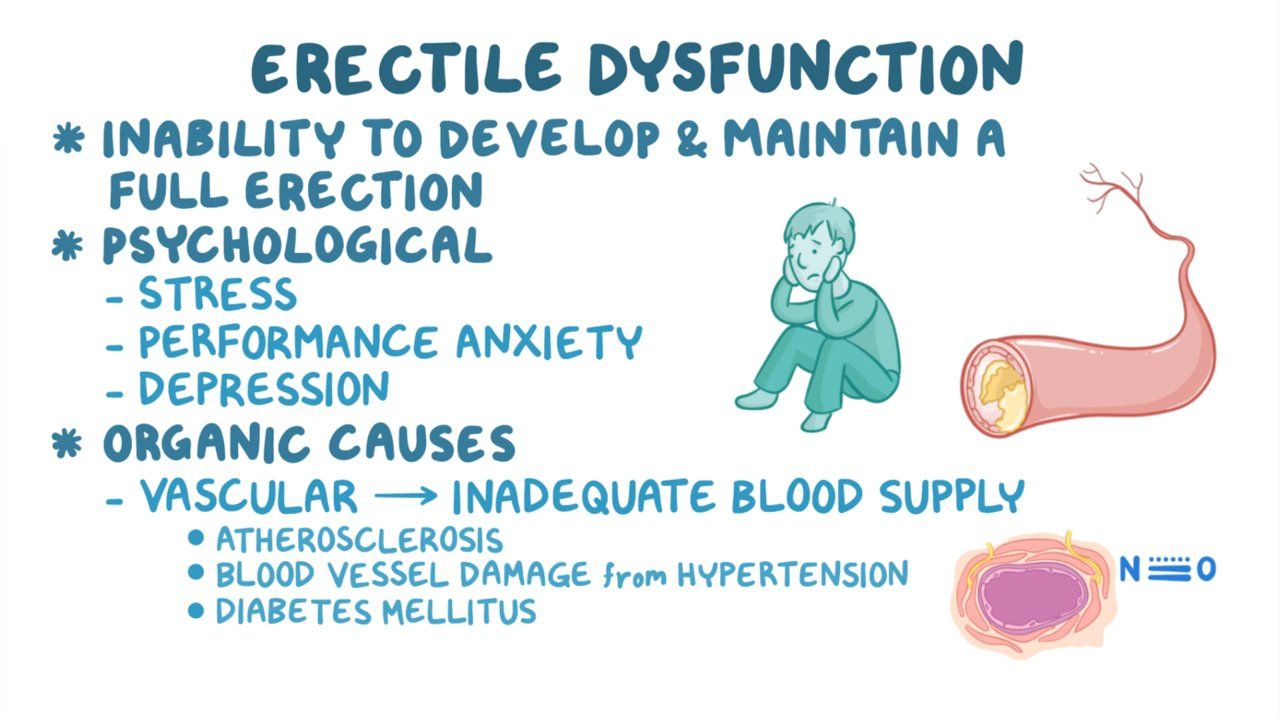Erectile Dysfunction: A Deeper Look
Erectile dysfunction (ED) refers to the persistent inability to achieve or maintain an erection firm enough for sexual intercourse. It is a common condition, affecting millions of men worldwide. ED can significantly impact a person's quality of life and self-esteem, as well as strain relationships.

Potential Causes of Erectile Dysfunction
ED can stem from various factors, both physical and psychological. It is essential to understand the potential underlying causes to determine appropriate treatment options. Common physical causes include:
- Cardiovascular disease
- High blood pressure
- Diabetes
- Obesity
- Hormonal imbalances
- Side effects from certain medications
- Smoking
- Alcohol or substance abuse
Moreover, psychological factors such as stress, anxiety, depression, and relationship issues can contribute to ED. It is essential to consider all potential causes as it often involves a combination of physical and psychological triggers.
Recognizing the Symptoms
It is crucial to be aware of the symptoms associated with erectile dysfunction. The most obvious symptom is the inability to achieve or sustain an erection. However, some additional signs can help identify this condition:
- Difficulty initiating or maintaining an erection
- Reduced sexual desire
- Premature ejaculation
- Delayed ejaculation
- Erections that are not as firm as desired
If you experience any of these symptoms regularly, it is important to consult a healthcare professional for proper evaluation and diagnosis. Don't hesitate to seek assistance; effective treatments are available.
Treatment Options for Erectile Dysfunction
Treatment approaches for ED depend on its underlying cause. Here are some common treatment options:
- Lifestyle modifications, such as regular exercise, a balanced diet, and quitting smoking
- Medications that enhance blood flow to the penile area
- Counseling or therapy to address any psychological factors
- Hormone replacement therapy in cases of hormonal imbalances
- Penile implants or external vacuum devices as a last resort
It is crucial to consult with a healthcare professional to determine the best treatment plan for your individual needs. They can assess the underlying causes and recommend appropriate solutions.
Remember, addressing and treating erectile dysfunction is possible, allowing for a healthier and more satisfying lifestyle. With the right support and guidance, individuals can regain confidence and enjoy improved sexual well-being.
Related FAQs about what is erectile dysfunction
What are the common physical causes of erectile dysfunction?
Common physical causes of erectile dysfunction include cardiovascular disease, high blood pressure, diabetes, obesity, hormonal imbalances, side effects from certain medications, smoking, and alcohol or substance abuse.
Can psychological factors contribute to erectile dysfunction?
Yes, psychological factors such as stress, anxiety, depression, and relationship issues can contribute to erectile dysfunction. It is important to consider both physical and psychological triggers when addressing this condition.
What are the symptoms of erectile dysfunction?
The symptoms of erectile dysfunction include difficulty initiating or maintaining an erection, reduced sexual desire, premature ejaculation, delayed ejaculation, and erections that are not as firm as desired.
What are some treatment options for erectile dysfunction?
Treatment options for erectile dysfunction include lifestyle modifications (exercise, diet, smoking cessation), medications that enhance blood flow to the penile area, counseling or therapy to address psychological factors, hormone replacement therapy, and penile implants or external vacuum devices as a last resort.
Why is it important to seek professional help for erectile dysfunction?
It is important to seek professional help for erectile dysfunction because healthcare professionals can evaluate the underlying causes, provide an accurate diagnosis, and recommend the most suitable treatment options. They can offer guidance and support in addressing this issue effectively.
Glossary about what is erectile dysfunction
1. Erectile Dysfunction: Erectile dysfunction (ED) refers to the persistent inability to achieve or maintain an erection firm enough for sexual intercourse. It is a common condition, affecting millions of men worldwide. ED can significantly impact a person's quality of life and self-esteem, as well as strain relationships.
2. Cardiovascular Disease: Cardiovascular disease refers to a class of diseases that involve the heart or blood vessels, including conditions like coronary artery disease, heart failure, and high blood pressure. It is a potential physical cause of erectile dysfunction.
3. High Blood Pressure: High blood pressure, also known as hypertension, is a medical condition where the force of blood against the artery walls is too high. It can contribute to erectile dysfunction.
4. Diabetes: Diabetes is a chronic health condition characterized by high blood sugar levels. It can lead to nerve damage and blood flow problems, potentially causing erectile dysfunction.
5. Obesity: Obesity is a medical condition characterized by excessive body weight, often resulting from unhealthy dietary habits and low physical activity. It is associated with an increased risk of developing erectile dysfunction.
6. Hormonal Imbalances: Hormonal imbalances refer to disrupted levels of hormones in the body. Fluctuations in testosterone or other hormones can contribute to erectile dysfunction.
7. Premature Ejaculation: Premature ejaculation is a common sexual disorder where ejaculation occurs earlier than desired during sexual activity. It can coexist with erectile dysfunction and impact sexual performance.
8. Delayed Ejaculation: Delayed ejaculation is a condition characterized by a significant delay in ejaculation or the inability to achieve ejaculation during sexual intercourse. It can be associated with erectile dysfunction.
9. Penile Implants: Penile implants are medical devices surgically inserted into the penis. They are a last-resort treatment option for erectile dysfunction and help achieve erections by simulating a natural erection.
10. Vacuum Devices: Vacuum devices, also known as penis pumps, are external devices that create a vacuum around the penis, pulling blood into the area and facilitating an erection. They can be used as a treatment for erectile dysfunction.
